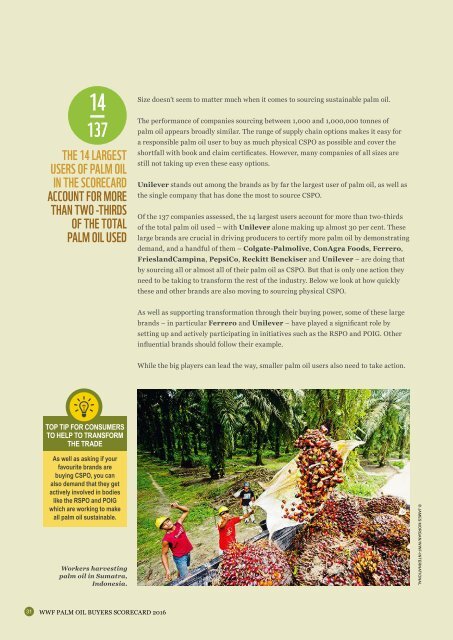Palm Oil Buyers Scorecard
WWF_Palm_Oil_Scorecard_2016
WWF_Palm_Oil_Scorecard_2016
Create successful ePaper yourself
Turn your PDF publications into a flip-book with our unique Google optimized e-Paper software.
14 —<br />
137<br />
THE 14 LARGEST<br />
USERS OF PALM OIL<br />
IN THE SCORECARD<br />
ACCOUNT FOR MORE<br />
THAN TWO -THIRDS<br />
OF THE TOTAL<br />
PALM OIL USED<br />
The performance of companies sourcing between 1,000 and 1,000,000 tonnes of<br />
palm oil appears broadly similar. The range of supply chain options makes it easy for<br />
a responsible palm oil user to buy as much physical CSPO as possible and cover the<br />
shortfall with book and claim certificates. However, many companies of all sizes are<br />
still not taking up even these easy options.<br />
Unilever stands out among the brands as by far the largest user of palm oil, as well as<br />
the single company that has done the most to source CSPO.<br />
Of the 137 companies assessed, the 14 largest users account for more than two-thirds<br />
of the total palm oil used – with Unilever alone making up almost 30 per cent. These<br />
large brands are crucial in driving producers to certify more palm oil by demonstrating<br />
demand, and a handful of them – Colgate-<strong>Palm</strong>olive, ConAgra Foods, Ferrero,<br />
FrieslandCampina, PepsiCo, Reckitt Benckiser and Unilever – are doing that<br />
by sourcing all or almost all of their palm oil as CSPO. But that is only one action they<br />
need to be taking to transform the rest of the industry. Below we look at how quickly<br />
these and other brands are also moving to sourcing physical CSPO.<br />
Size doesn’t seem to matter much when it comes to sourcing sustainable palm oil.<br />
As well as supporting transformation through their buying power, some of these large<br />
brands – in particular Ferrero and Unilever – have played a significant role by<br />
setting up and actively participating in initiatives such as the RSPO and POIG. Other<br />
influential brands should follow their example.<br />
While the big players can lead the way, smaller palm oil users also need to take action.<br />
TOP TIP FOR CONSUMERS<br />
TO HELP TO TRANSFORM<br />
THE TRADE<br />
As well as asking if your<br />
favourite brands are<br />
buying CSPO, you can<br />
also demand that they get<br />
actively involved in bodies<br />
like the RSPO and POIG<br />
which are working to make<br />
all palm oil sustainable.<br />
Workers harvesting<br />
palm oil in Sumatra,<br />
Indonesia.<br />
© JAMES MORGAN/WWF-INTERNATIONAL<br />
31 WWF PALM OIL BUYERS SCORECARD 2016




